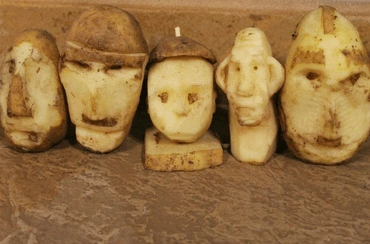1
Or les Philistins combattirent contre Israël, et ceux d'Israël s'enfuirent de devant les Philistins, et furent tués en la montagne de Guilboah.
2
Et les Philistins atteignirent Saül et ses fils, et tuèrent Jonathan, Abinadab et Malki-suah, fils de Saül.
3
Et le combat se renforça contre Saül, et les archers tirant de l'arc le trouvèrent; et il eut fort grande peur de ces archers.
4
Alors Saül dit à son écuyer : Tire ton épée, et m'en transperce, de peur que ces incirconcis ne viennent, ne me transpercent, et ne se jouent de moi; mais son écuyer ne le voulut point faire, parce qu'il était fort effrayé. Saül donc prit l'épée, et se jeta dessus.
5
Alors l'écuyer de Saül ayant vu que Saül était mort, se jeta aussi sur son épée, et mourut avec lui.
6
Ainsi mourut en ce jour-là Saül et ses trois fils, son écuyer, et tous ses gens.
7
Et ceux d'Israël qui étaient au deçà de la vallée, et au deçà du Jourdain, ayant vu que les Israëlites s'en étaient fuis, et que Saül et ses fils étaient morts, abandonnèrent les villes, et s'enfuirent, de sorte que les Philistins y entrèrent, et y habitèrent.
8
Or il arriva que dès le lendemain les Philistins vinrent pour dépouiller les morts, et ils trouvèrent Saül et ses trois fils étendus sur la montagne de Guilboah.
9
Et ils coupèrent la tête de Saül, et le dépouillèrent de ses armes, qu'ils envoyèrent au pays des Philistins, dans tous les environs, pour en faire savoir les nouvelles dans les temples de leurs faux dieux, et parmi le peuple.
10
Et ils mirent ses armes au temple de Hastaroth, et attachèrent son corps à la muraille de Bethsan.
11
Or les habitants de Jabés de Galaad apprirent ce que les Philistins avaient fait à Saül.
12
Et tous les vaillants hommes [d'entr'eux], se levèrent et marchèrent toute la nuit, et enlevèrent le corps de Saül, et les corps de ses fils, de la muraille de Bethsan, et revinrent à Jabés, où ils les brûlèrent.
13
Puis ils prirent leurs os, les ensevelirent sous un chêne près de Jabés, et ils jeûnèrent sept jours.







